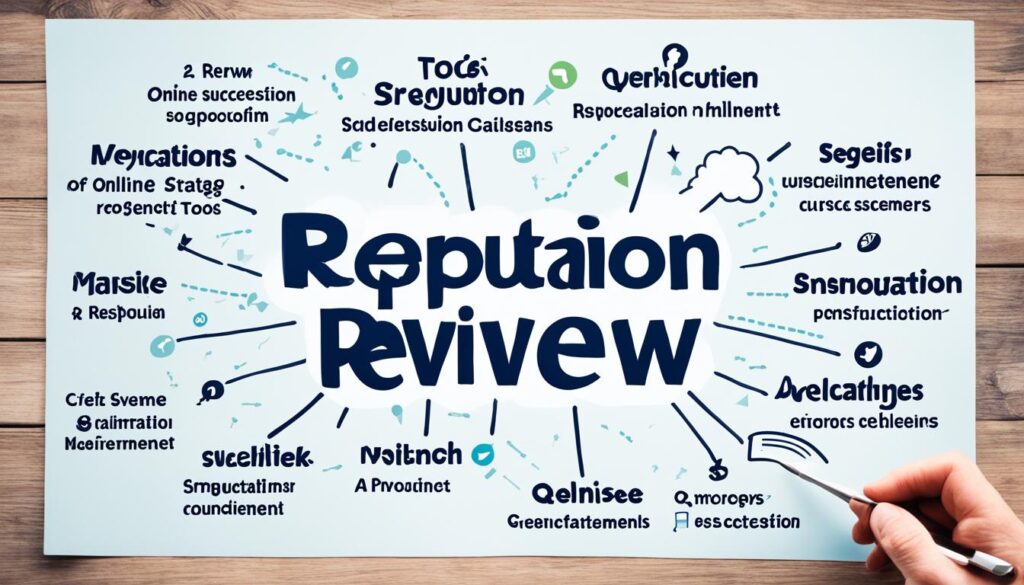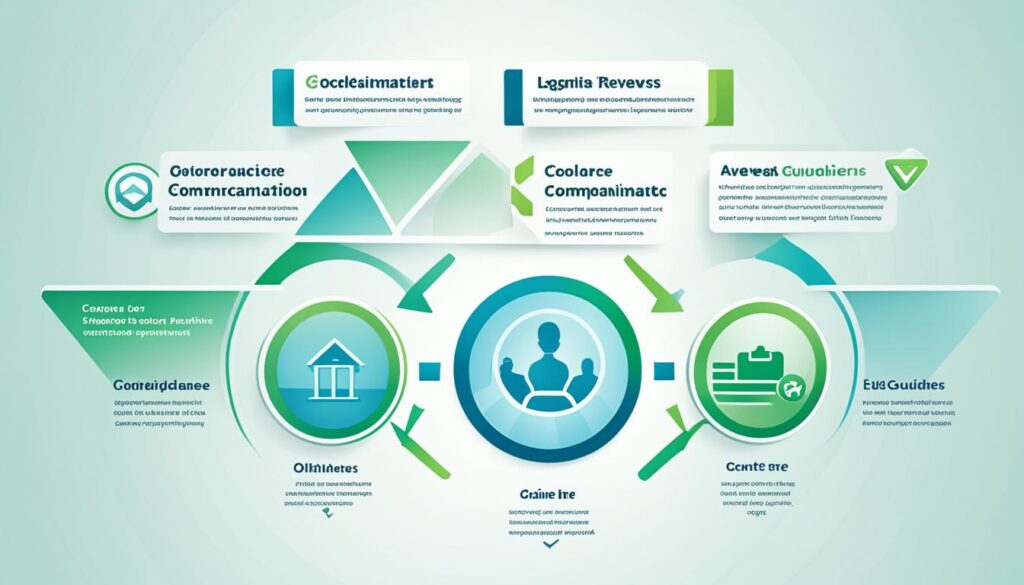Is your business ready for the challenges of online reviews? Today, what customers say online can greatly affect a brand’s image. With 97% of consumers reading reviews before buying, managing online reviews well is key1.
We’re looking into how businesses can handle online reviews. We’ll talk about making rules that protect your reputation and follow the law. We’ll also discuss how to use technology to manage customer feedback in today’s digital world.
When dealing with reviews, companies must be careful. Some sites only let verified buyers leave reviews, while others offer rewards for feedback. This can lead to biased opinions2. It’s important to find a middle ground between encouraging feedback and keeping it real.
Good review management is more than just fixing problems. It’s about gaining trust and credibility. Almost 60% of U.S. consumers won’t buy from a brand they don’t trust1. By having strong rules and policies, businesses can keep customers happy and protect their online image.
Key Takeaways
- Develop clear guidelines for collecting and managing online reviews
- Ensure legal compliance in review management practices
- Create a comprehensive strategy for responding to customer feedback
- Use technology to streamline review management processes
- Maintain authenticity and transparency in all review-related activities
- Treat positive and negative reviews equally to build trust
- Regularly monitor and analyze review data for continuous improvement
Understanding the Importance of Online Review Management
Managing online reviews is key to building trust and credibility with customers. A huge 98% of people check out reviews for local businesses online3. Moreover, 46% see online reviews as trustworthy as advice from friends and family3.
Reviews greatly affect how customers act. 72% won’t make a move without checking reviews first, and 94% will avoid a business due to a bad review4. This shows how crucial it is for businesses to keep an eye on their online image and quickly respond to feedback.
Good review management offers insights into what customers like and what needs work. Using positive feedback in marketing can boost a brand. It’s also key to answer reviews, even the negative ones. 44.6% of people are more likely to visit a business if the owner replies to bad reviews4.
“Online reviews are the digital equivalent of word-of-mouth recommendations. They shape perceptions and drive decisions in the modern marketplace.”
To get the most from online reviews, focus on platforms like Google Business Profile, Facebook Pages, and TripAdvisor3. These sites let you connect with customers and show you care about their satisfaction.
| Platform | Key Feature | Industry Focus |
|---|---|---|
| Google Business Profile | Knowledge Panel visibility | All local businesses |
| Facebook Pages | Recommendations system | Social media-active businesses |
| TripAdvisor | Travel-focused reviews | Hospitality and tourism |
With a strong review management plan, businesses can improve their online image, learn from customers, and grow in the digital world.
Identifying Key Review Platforms for Your Business
Knowing where to focus your efforts in managing your online reputation is key. Google Business Profile is the top platform for reviews. A huge 63.6% of consumers check Google reviews before visiting a business5.

Google is a leader, but Facebook Pages, TripAdvisor, and Yelp are also big players. Each platform targets different industries and people. TripAdvisor is great for travel and hospitality reviews, while Yelp is a hit for local spots.
Google lets businesses ask for reviews, unlike some others. This can really help your review strategy6. Also, sites like G2 for software reviews have their own rules. G2 makes sure reviewers are real by checking their LinkedIn or business email7.
| Platform | Key Features | Best For |
|---|---|---|
| Google Business Profile | Highest visibility, allows review requests | All local businesses |
| Facebook Pages | Social media integration, recommendations | B2C businesses |
| TripAdvisor | Travel-focused, detailed reviews | Hotels, restaurants, attractions |
| Yelp | Local focus, strict review policies | Local service businesses |
| G2 | Verified reviewers, industry-specific | Software and tech companies |
Asking for reviews can boost your ratings. Businesses that ask for them get an average of 4.34 stars, while those that don’t get 3.89 stars5. By knowing what each platform offers and who uses it, you can make your review strategy work better.
Creating a Comprehensive Online Review Strategy
Having a strong online review strategy is key for businesses today. With 99.9% of consumers checking out reviews before buying online, it’s clear reviews are crucial8. Let’s look at the main parts of a good review strategy.

Keeping an eye on where customers share their thoughts is the first step. This lets us answer quickly and keep a good online image.
Having a plan for how to respond is vital. Our team should be ready for both good and bad feedback. Remember, 82% of people read reviews for local businesses, and good reviews make 52% more likely to choose a business9.
Engaging with customers is central to our strategy. We’ll use a feedback loop to get insights and make our products better. This helps us grow and shows customers we care about their opinions.
Encouraging happy customers to leave reviews is important. As 71% of consumers would give feedback if asked10. By sharing good reviews on our site and social media, we can improve our image and draw in more customers.
To make things easier, we’ll use technology for managing reviews. Tools like Weave can automate the review process, helping us keep a strong online presence across many platforms10.
With this detailed strategy, we can use online reviews to grow and gain trust with our customers.
Online Review Guidelines and Policies
We have set clear rules for managing online reviews. These rules follow legal and ethical standards. They make sure reviews are real and fair.
Our rules match those of platforms like Google’s User Contributed Content Policy. We don’t allow fake reviews or feedback that’s paid for11. Our team spots and deals with fake reviews. They encourage real feedback from customers.

Managing content is key to our review strategy. We have a process for spotting and asking for the removal of bad content. This keeps our online reputation strong and follows the law.
Here are some key facts about online reviews:
- 75% of consumers often read online customer reviews
- 50% trust reviews as much as personal advice
- 88% are more likely to use a business that answers reviews12
Our guidelines also cover how to handle negative reviews. Our staff learns to respond well and keep sensitive info private. This follows rules like the American Bar Association Model Rule 1.6(a).
By following these rules, we keep reviews real, follow the law, and act ethically with our online reviews13.
Best Practices for Responding to Reviews
Handling reviews well is key for businesses today. Almost all consumers check out reviews before they decide to buy14. To be great at customer service and solving problems, we need to be quick to respond to reviews.
It’s important to answer all reviews quickly. Try to do this within a day. Quick replies show customers we care about their thoughts and can make things better15. Plus, up to 97% of people read what companies say in response to reviews14.

It’s vital to give personal answers. Call customers by their names and thank them for good feedback. This can draw in new customers who see these interactions15. For bad reviews, do some research, say sorry sincerely, and offer ways to fix the issue.
Keeping your brand’s voice the same in all responses is key. This builds trust and makes you more recognizable. Even when facing criticism, stay professional and show you’re committed to getting better15.
“64% of people would prefer to buy from a responsive company rather than one with a perfect rating.”
This fact shows how important it is to really engage with reviews14. By answering well, we can turn bad experiences into good ones. In fact, 79% of customers might leave a good review if a business listens to their concerns and fixes them14.
| Review Type | Response Strategy | Potential Outcome |
|---|---|---|
| Positive | Thank customer, reinforce positives | Increased loyalty, attract new customers |
| Neutral | Address concerns, highlight positives | Improve customer loyalty |
| Negative | Apologize, offer solutions, take offline | Change perception, potential positive review |
By always answering reviews, businesses can get 12% more reviews and might boost their overall rating by half a star in six months16. This active approach can greatly improve your online image and make customers happier.
Leveraging Technology for Efficient Review Management
In today’s digital world, review management software is key to handling customer feedback efficiently. With 88% of Americans trusting online reviews, businesses need AI-powered solutions to stay ahead17.
AI technology uses Natural Language Processing (NLP) to understand customer feelings and needs. This makes managing reviews faster and cheaper. It also means quicker responses to customer feedback18.
Data analytics tools help spot trends in what customers are saying. For businesses with many locations, these tools let them compare and report across all sites. This makes managing reviews easier and more consistent everywhere.
“AI-generated responses ensure consistency in brand voice, contributing to improved brand image and customer loyalty.”
AI can give personalized answers to customer questions, making customers happier and more loyal. This is a smart way for businesses with not much budget to handle reviews18.
| Feature | Benefit |
|---|---|
| AI-powered automation | Analyzes customer sentiment at scale |
| Automated responses | Ensures consistency in brand voice |
| Data analytics | Identifies trends in customer feedback |
| Multi-location management | Enables cross-location comparisons |
Using AI in review management helps businesses improve how they talk to customers, make things run smoother, and boost their online image. This tech is vital for success online, offering speed, accuracy, and a personal touch for better customer interaction and success18.
Conclusion
Managing online reviews is key in today’s digital world. It helps keep our online reputation strong and keeps customers happy. We’ve looked at how to handle feedback on different platforms. This strategy boosts our online presence and gives us insights for getting better.
Using the best ways to answer reviews and technology for managing them turns customer feedback into a growth tool. Every review, good or bad, is a chance to show we care about being the best. Companies that ignore fake or wrong reviews might face big fines, as seen in cases where companies got fined for faking reviews19.
Good online review management gives us an edge in the market. By keeping an eye on, analyzing, and acting on customer feedback, we can make real changes to our products and services. This active approach not only improves our online image but also builds trust with potential customers. This trust is key for success online.
FAQ
Why is online review management important for businesses?
How can businesses identify the most relevant review platforms?
What should a comprehensive online review strategy include?
What guidelines and policies should businesses follow when managing online reviews?
What are the best practices for responding to online reviews?
How can technology help with efficient review management?
Source Links
- A Beginner’s Guide to Online Reputation Management – https://www.semrush.com/blog/online-reputation-management/
- Featuring Online Customer Reviews: A Guide for Platforms – https://www.ftc.gov/business-guidance/resources/featuring-online-customer-reviews-guide-platforms
- Creating an online review management strategy – https://sproutsocial.com/insights/online-review-management/
- Online Review Management Guide: 3 Foundational Strategies – https://www.reviewtrackers.com/blog/online-review-management/
- Google Reviews: The Complete Guide for Businesses – https://www.reviewtrackers.com/guides/google-reviews/
- What Businesses Need to Know About Google’s Review Policy – https://www.reviewtrackers.com/blog/google-review-policy/
- Community Guidelines | G2 – https://legal.g2.com/community-guidelines
- The Complete Guide to Ratings & Reviews (2023 Edition) – PowerReviews – https://www.powerreviews.com/complete-guide-ratings-reviews-2023/
- How to Manage Online Reviews for a Better Online Reputation – FasterCapital – https://fastercapital.com/content/How-to-Manage-Online-Reviews-for-a-Better-Online-Reputation.html
- Google Reviews Guide: How to Write, Delete & Get More Online Reviews – https://www.getweave.com/google-reviews/
- The Rules of Online Reviews: tips for hoteliers – https://blog.guestrevu.com/the-rules-of-online-reviews-tips-for-hoteliers
- Asking for Reviews for Local Businesses in 2024: The Owner’s Guide – https://www.madisonmarketing.com/blog/best-practices-for-asking-for-online-reviews
- Prohibited & restricted content – Maps User Contributed Content Policy Help – https://support.google.com/contributionpolicy/answer/7400114?hl=en
- Why You Should Respond to Online Reviews – https://www.businessnewsdaily.com/9187-respond-to-online-reviews.html
- Responding to Online Reviews: The Ultimate Guide – https://www.textrequest.com/insights/responding-to-online-reviews-ultimate-guide
- Google Reviews: How to Respond to Positive & Negative Reviews – https://www.widewail.com/guide-review-response
- Online Review Guidelines: What They Are, Why They Matter and How to Follow Them – Reputation – https://reputation.com/resources/articles/online-review-guidelines/
- Leveraging AI for Enhanced Google Review Management – https://www.linkedin.com/pulse/leveraging-ai-enhanced-google-review-management-shuppert-rizvi-v81zc
- Online product and service reviews – https://www.accc.gov.au/business/advertising-and-promotions/online-product-and-service-reviews

